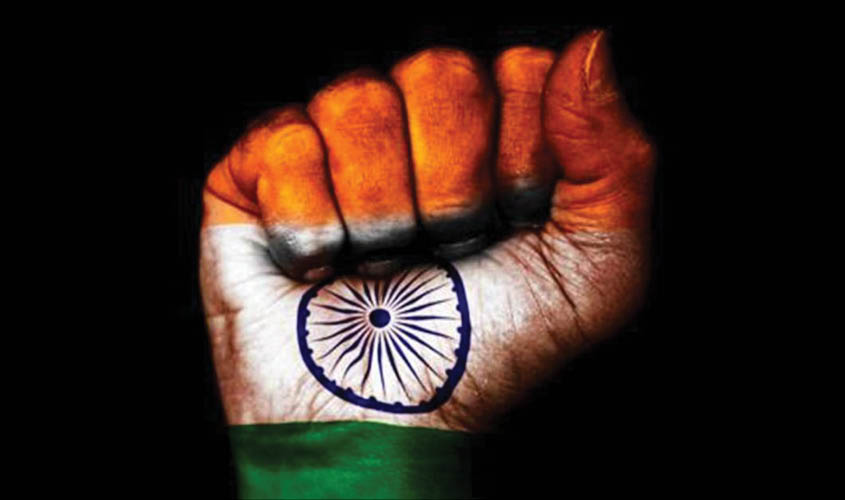Pakistan’s agenda was being faithfully carried out by our own Opposition parties; with countrymen like these who needs enemies?
In the charged atmosphere of escalating hostilitiyes with a malignant neighbour one would have expected an unconditional solidarity from all our countrymen; a unity of purpose and a congruity of speech consistent with our oneness. But alas what unravelled was a sordid spectacle of rank political skulduggery, self-destructive innuendoes and egotistical animosity that trumped national interest; an orchestrated climate of dangerous dissension in which neither the sovereignty of the nation nor the morale of our armed forces was sacred.
First, every attempt was made to glorify Pakistan and denigrate our own government. Acting as a cheerleader for this vile diatribe was the Congress Party. Immediately after Balakot, the party led a 21-party Opposition coalition into issuing a statement bemoaning the “blatant politicisation” of the airstrike. Senior party leader Digvijaya Singh then offered congratulations to “the honorable Prime Minister of Pakistan Imran Khan for showing us a new way of being a good neighbour”. He also surmised “I can only say that we have not seen a bigger liar than Narendra Modi”. Mehbooba Mufti chimed in singing paeans to the “real statesmanship” of the Pakistani PM.
These statements were ludicrous, to say the least. Imran Khan, the leader of a military run state that harbours and encourages terrorism against India was being lauded as opposed to a democratic government battling terrorism.
Anyway, statements emanating from India were music to Pakistan’s ears. Digvijaya Singh’s image was constantly flashed across Pak TV and his statements replayed innumerable times to depict India’s response as an act of politically motivated, irresponsible war mongering; an ode to our supposed dysfunctionality.
Pakistan’s agenda was being faithfully carried out by our own Opposition parties; with countrymen like these who needs enemies?
More repulsive than this misplaced adulation for Pakistan and the thrashing of Modi was the concerted effort to discredit the achievements of our armed forces. Latching on to dubious snippets of data gathered by commercial (not military) entities and put out by fly by night, freelance amateurs (not military experts), Congress leaders like Kapil Sibal and Sam Pitroda, a Rahul Gandhi confidant and a host of BJP antagonists went to town questioning the authenticity of the airstrikes, overriding the evidence presented by our own armed forces.
Writing in the Telegraph (2 March 2019), the historian, Ram Guha pondered: “What, then, are the obligations of a writer or reporter in a time like this? Must he or she swallow the government’s line entirely, since a state that borders ours is waging a covert war against us?… Or else, should we call out the government for its failures and mis-statements?… Would not exposing claims made for partisan purposes be, in fact, an exercise in patriotism.”
Yes, democracy gives every citizen the right to question the government and we should. But democracy is not a free for all where everything and anything goes. There is a time and place for debate.
The questions that have been raised can certainly be deliberated upon and will be seen as an act of patriotism if voiced in the right manner and at the right time when the crises situation has passed. But at this point in time these vituperations must be called out for they are: vile, irresponsible, self-seeking rants and an abuse of democracy.
Instead of concentrating on securing our borders from the nefarious designs of our enemy at a crucial juncture, the chiefs of our armed forces were repeatedly forced to come out and justify their actions in front of sceptical and belligerent detractors. If this is not irresponsibility what is?
Added to all this was a malicious attempt to besmirch the nationalist spirit by highlighting stray incidents of questionable factuality. In the aftermath of Pulwama, activist Shehla Rashid tweeted that 15-20 Kashmiri girls were under siege in a Dehradun hostel, which was found to be untrue. Instances of road rage wherein the victims incidentally happened to be Kashmiris were twisted into hate crimes. Such falsity cannot be allowed to prevail and undermine our resolve.
Can a nation fight two battles, one from without and one from within and succeed, is an existential question that provokes a pertinent corollary: What is a nation?
In his famous essay “What is a Nation?”, Ernest Renan (1823-1892) an important French theorist called a nation “a large scale solidarity” and defined it as a “soul, a spiritual principle” united by two things: “One lies in the past, one in the present. One is the possession in common of a rich legacy of memories; the other is present-day consent, the desire to live together, the will to perpetuate the value of the heritage that one has received in an undivided form.”
Pluralism and democracy, our heritage is under siege by a fanatical terrorism aided and abetted by a military run, quasi-theocratic state. Period. We need to be united in our resolve against this evil scourge with no place for meaningless ruminations or splitting hairs.
I hope and wish all Indians realise that
Vivek Gumaste is a US based academic and political commentator.

